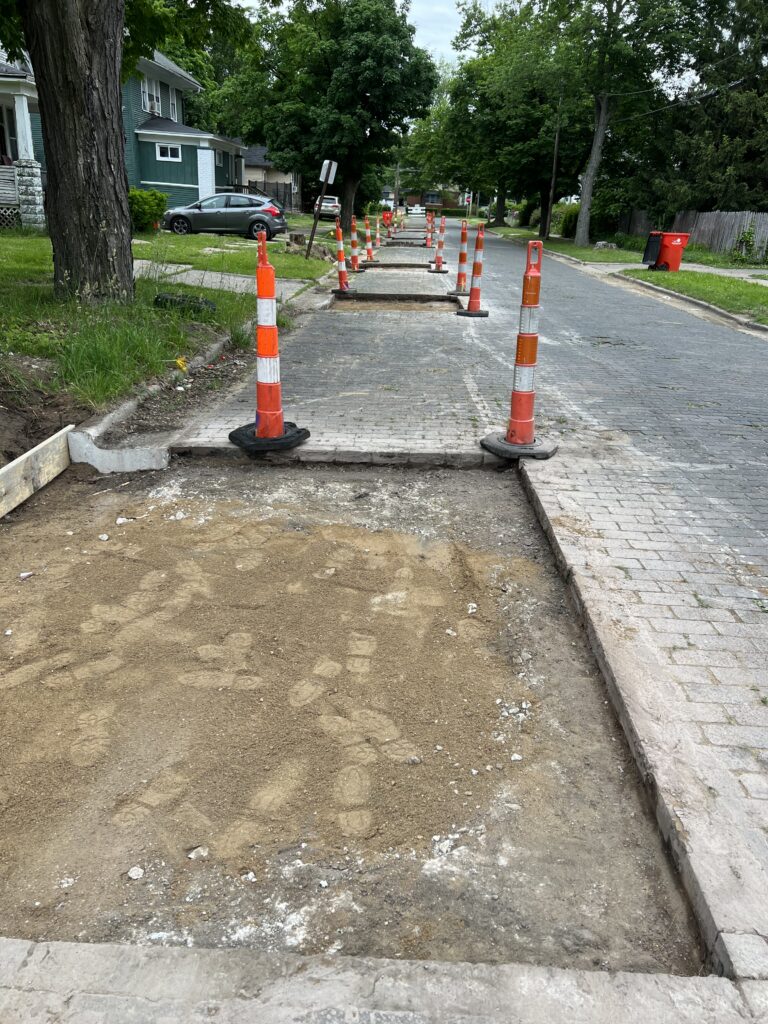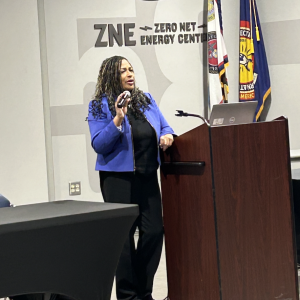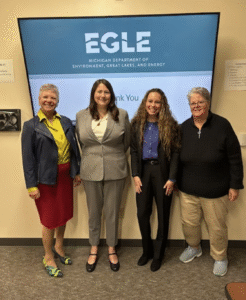
- Kim Kisner
- Business
- 12/10/2024
From Lead Contamination to Rising Rates, Southeast Michigan Faces a Critical Need

Southeast Michigan faces significant challenges in water infrastructure and safety, particularly in addressing aging systems, lead contamination, and ensuring equitable access to clean drinking water. Safe Water Engineering LLC, a Detroit-based consulting firm founded by Elin Warn Betanzo, focuses on improving access to safe drinking water through engineering and policy solutions.
As the architect behind Detroit’s lead service line replacement program, Betanzo has played a key role in improving water safety in the region. The city has replaced over 11,000 lead service lines since 2018, providing safer drinking water to thousands of residents. Beyond infrastructure, Betanzo’s work also focuses on water safety and affordability policies.
SBN Detroit had the opportunity to interview Betanzo regarding the challenges and opportunities surrounding water management in Southeast Michigan, the lead pipe replacement efforts, and the steps needed to ensure sustainable and equitable access to clean water.

Q: What is the impetus behind Safe Water Engineering?
A: I started Safe Water Engineering in 2017 after the Flint water crisis revealed a critical need for specialized expertise in lead and drinking water safety. Our work focuses on helping water utilities meet and go beyond compliance requirements for drinking water safety and supporting communities by providing access to data, information, and education.
Q: Can you tell us more about the city’s lead service line replacement program you designed and your work in drinking water policy?
A: From 2017 to 2020, I worked with the Detroit Water and Sewerage Department (DWSD) to design the city’s lead service line replacement program. At the time, it wasn’t a regulatory requirement, but Detroit wanted to take a proactive approach.
My work involved developing procedures for conducting lead service line replacements, incorporating replacements into broader infrastructure projects, conducting outreach to residents, and ensuring safety during replacements – like providing filters and flushing instructions. We also created a comprehensive program outlining responsibilities, timelines, and costs.
The program is now underway, and the city has committed to replacing all lead service lines within ten years.
Q: What are the biggest challenges communities in Southeast Michigan face in ensuring clean and safe water?
A: Southeast Michigan’s water infrastructure relies on the backbone of water and sewer mains that Detroit built during the last century. It was designed and constructed for the time when it was built – a different population distribution and climate conditions than we have now. Over time, the region has faced significant changes, including population shifts, aging infrastructure, and climate impacts like altered precipitation patterns.
Key challenges include the need to renew and replace aging water mains, sewer systems, and lead service lines, many of which were installed during the first half of the last century.
Additionally, when water rates were set in many communities, they did not account for the necessary infrastructure renewal costs especially when they relied on existing infrastructure to expand. This becomes a challenge when we see this multitude of issues and challenges coinciding. It is essential to ensure public health protection is maintained as a top priority while developing water affordability programs to ensure everyone can afford access to that protection.
Q: How has climate change impacted water systems in the region, particularly with issues like flooding, stormwater management, and aging infrastructure?
A: The magnitude and frequency of extreme rainfall events have increased significantly in recent years, with Southeast Michigan experiencing multiple 100-year storms within a five-year span. The current infrastructure was not designed to handle such high volumes of water, leading to challenges like stormwater runoff overwhelming wastewater systems, and causing untreated releases into the Detroit River and Lake St. Clair.
Additionally, urban development has created more paved surfaces, increased runoff, and disrupted natural drainage systems. This combination has led to significant flooding issues, further straining aging wastewater and stormwater systems.
Q: Why are lead service lines a concern, and what is being done to address them in Southeast Michigan?
A: In Michigan, community water systems were required to report the potential presence of lead service lines to the state in 2020. Statewide, up to 26% of these systems may have lead service lines, with Southeast Michigan particularly affected.
For example, Detroit alone has up to 108,000 lead service lines, and potentially twice as many may exist in the surrounding communities.

When water – although treated with corrosion control at treatment plants – passes through leaded materials, lead is frequently measured at the faucet – the point where it becomes drinking water. Lead in drinking water poses a significant health risk, as it is a neurotoxin with no safe level of exposure.
Michigan was the first state that required mandatory lead service line replacement, mandating the removal of all lead service lines by 2041. A new federal rule accelerates this timeline nationally, requiring removal by 2037.
Utilities are also required to notify residents if their home has lead pipes, enabling them to take precautions like using certified lead-reducing filters, which are highly effective when properly maintained.
Q: What are the challenges involved in making Southeast Michigan’s drinking water safer and more affordable?
A: Unlike housing, food, and electricity, Michigan lacks a statewide water affordability program. Rising water rates to fund infrastructure upgrades have made water unaffordable for some households, despite the public health necessity of these investments.
There are programs like the Great Lakes Water Authority’s WRAP Program and DWSD’s Lifeline Plan, but the need for support exceeds the current resources available. Legislation to create a statewide water affordability program is under consideration, but challenges remain in addressing the broader affordability gap.
Q: What strategies or technologies are being implemented to address lead contamination, and what additional steps are necessary beyond lead pipe replacement?
A: Lead service line replacement is critical, but residents don’t have to wait for this to happen to reduce their exposure to lead in water. Certified lead-reducing filters are available and highly effective, provided they are properly maintained. Public education is essential to ensure residents understand the risks and how to take action.
Additionally, programs like the Michigan Department of Health and Human Services’ targeted filter initiatives provide resources to low-income households and communities with known lead issues.
Q: In your opinion, what are the greatest opportunities for Southeast Michigan to improve its water infrastructure and management over the next decade?
A: One opportunity lies in adopting a more holistic approach to planning and evaluating water quality across interconnected Southeast Michigan communities and to continue planning and addressing our challenges as a region. Most Southeast Michigan communities get their water from the five GLWA water treatment plants so there is an opportunity to evaluate and address drinking water quality and trends across the region.
Another significant opportunity is workforce development. The water sector offers diverse career paths and job security, straight out of high school or with a college degree. It is rewarding to work in an area that’s so necessary and impacts the health of our communities. There are many opportunities for young people to get involved and become the next generation to ensure Southeast Michigan has reliable, safe drinking water.
Be sure to subscribe to our newsletter for regular updates on sustainable business practices in and around Detroit.
Kim Kisner
- All
- Business
- Community
- Education
- Events

Detroit-based OneSix Energy is a clean-energy technology company focused on advancing a lower-carbon approach to hydrogen production. Headquartered at Newlab in Detroit, the startup is developing a proprietary methane pyrolysis system designed to produce hydrogen without carbon dioxide emissions, while also generating solid carbon as a co-product. SBN Detroit interviewed with cofounder Stefan Sysko about the company’s origins, its approach to hydrogen production, and why Detroit is positioned...

Regina Strong serves as Michigan’s first Environmental Justice Public Advocate, leading the state’s Office of the Environmental Justice Public Advocate. Her role focuses on addressing environmental justice concerns raised by communities, helping residents navigate environmental systems, and working across state agencies to improve equity in environmental decision-making. SBN Detroit interviewed Strong about the challenges communities are facing across Michigan and what environmental justice work looks like in practice....

Founded in 1965, Gensler is a global architecture and design firm working across sectors including urban development, commercial real estate, and civic infrastructure. SBN Detroit sat down with Najahyia Chinchilla, senior associate and sustainability consultant, to discuss mass timber, embodied carbon, and what sustainable construction means for Southeast Michigan. Q: Why is wood re-emerging right now as a serious option for large-scale, urban construction? A: Mass timber blends strength, sustainability, and design quality in ways few materials can. Wood has...







